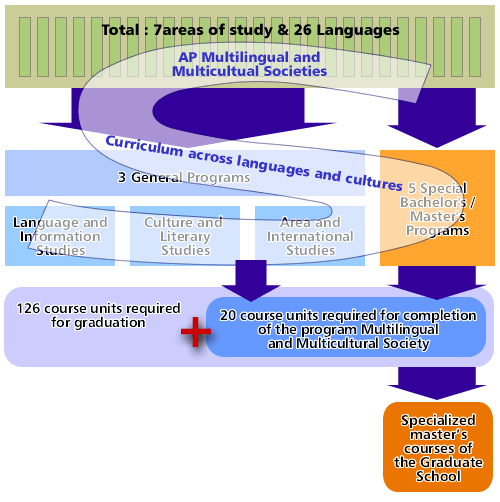The Add-on Program, “Multilingual and Multicultural Society”
By establishing a unique set of subjects across existing programs and courses of the University, the program “Multilingual and Multicultural Society” is aimed at imparting the appropriate education for multilingual and multicultural societies to students. It also aspires to nurture the students’ ability to resolve various problems faced by the Japanese multilingual and multicultural society. To students who complete the required units of the program, the “Add-on Program Certificate” will be issued.
Characteristics of the Add-on Program
1. Ingenious lectures that deepen the students’understanding
In order to facilitate the students in gaining a wide range of theoretical as well as practical knowledge about multilingual and multicultural societies, the program is highly innovated with the use of such participatory approaches as group work and presentations as well as joint lectures with international students. Moreover, the program aspires to help the students achieve compatibility between theories and practice by having them gain on-site experiences through training sessions and internship.
2. Projects and implementation in which teachers cooperate with each other beyond the frames of majors and systems
Teaching staff with diverse areas of expertise make up an implementation team to design the lectures by having recurrent discussions on factors such as the agenda and structure of lectures, selection of lecturers as well as grade calculation.
3. Diverse guest lecturers active in the front lines
Lectures are given not only by the teaching staff of the University but also by guest speakers with practical knowledge and experiences representing various fields including leading researchers of other universities, government officials, municipality mayors, lawyers, psychiatrists, elementary and junior high school teachers, NPO and NGO members, members of economic organizations and international exchange organizations.
4. Lectures open to local communities
Thanks to the “Civilian Auditing Student System”, many of the courses offered are also open to the general public, providing them with an opportunity to study among students (Applications are accepted in March and September). For details on this system, please refer to the Center’s website.

Subjects Offered
| Division | Subdivision | Minimum Requirements for Completion | Main Content |
|---|---|---|---|
| Introduction | 4 credit course (first & second semesters) |
The present situation of multilingualization and multiculturalization in Japan (A number of guest speakers working in the field will be invited). | |
| Theory | History and the Present | 2 credit course (half semester) | The history of multilingualization and multiculturalization in Japan and the world. |
| Societies and Cultures | 2 credit course (half semester) | Theories associated with multilingual and multicultural societies. | |
| Policies and the Law | 2 credit course (half semester) | The law and policies surrounding foreign people in Japan | |
| Languages and Communication | 2 credit course (half semester) | Problems related to languages and communication between differing languages and cultures. | |
| Language for Specific Purposes (LSP) | 4 credit course (first & second semesters) |
The basics of linguistic expressions and interpretation techniques specialized for the areas of “education”, “healthcare”, “disaster occurrence” and “public administration”. | |
| Internship | 2 credit course (half semester) | Lectures with the incorporation of training sessions including volunteer activities and internship (To be offered from 2008). | |
| Presentation | 2 credit course (half semester) | As the final refinement to the Add-on Program, the students present a summarized account of the experiences they have gained (To be offered from 2008). | |
| Total | 20 credit course | ||
Obtaining the “Add-on Program Certificate”
- Required Number of Course Units It is necessary to complete a total of 20 course units from all of the subdivisions and divisions.
- Stamp-rally Method Excluding the Presentation, it is free for the students to determine in which year and order to take the courses (the Stamp-rally Method).
- Enrolling in the Presentation Lectures of the Presentation are offered only to those who desire the accreditation of the Add-on Program Certificate. Therefore, it is required to ultimately complete the Presentation in order to receive accreditation of the Add-on Program completion.
- Enrollment Process Enrollment to lectures of the Presentation is recognized as enrollment to the Add-on Program. However, regarding program completion, the students are required to have completed all subjects of the Introduction and Theory Divisions. Moreover, regarding the subjects of the Language for Specific Purposes and Internship Divisions, students are required to have completed them or be in the process of taking them.
- Accreditation of Program Completion To students who complete the lectures of the Presentation, a certificate of the Add-on Program “Multilingual and Multicultural Society” will be issued.
Lectures of the Add-on Program are also offered to students who do not desire to receive accreditation of program completion, and the course units obtained can be added toward graduation according to a predefined rule.

